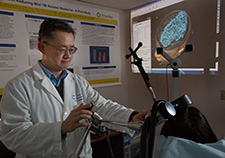Office of Research & Development |
 |


Dr. Albert Leung is testing whether transcranial magnetic stimulation can ease headaches associated with head trauma. (Photo by Kevin Walsh)
Transcranial magnetic stimulation (TMS) reduced the intensity of persistent daily headaches in 58 percent of Veterans who took part in a recent trial conducted by researchers at the VA San Diego Healthcare System.
In TMS, clinicians take an electromagnetic coil, charge it with electricity, and apply it to specific points on the skull. The result is a targeted magnetic field that can affect brain cells in a specific area.
TMS is FDA-approved for major depression that doesn't respond to other treatments, and for certain types of migraines. VA researchers are looking at the potential benefits of TMS for a variety of conditions involving the brain.
The San Diego study looked at 24 Veterans who had persistent daily headaches as a result of head trauma. Half received TMS three times within a week, and the other half got a sham treatment.
The magnetic coil treatment was used on the brain's left motor cortex, which past research has shown may be involved in headache pain. MRI images were fed into special software that allowed the research team to visualize the magnetic field and the study participant's brain in real time, and to focus the energy as a cone-shaped beam into the target region.
This helped to ensure that the same brain area was targeted in exactly the same manner in each participant, across all treatment sessions.
While 58 percent of Veterans receiving the treatment showed improvement after a week, only 17 percent of the sham group did so. After four weeks, the real-treatment group continued to show greater Improvement.
The researchers concluded that TMS "appears to be a clinically feasible and effective treatment option." They plan further tests of the treatment along with imaging studies to improve understanding of exactly how the treatment works.